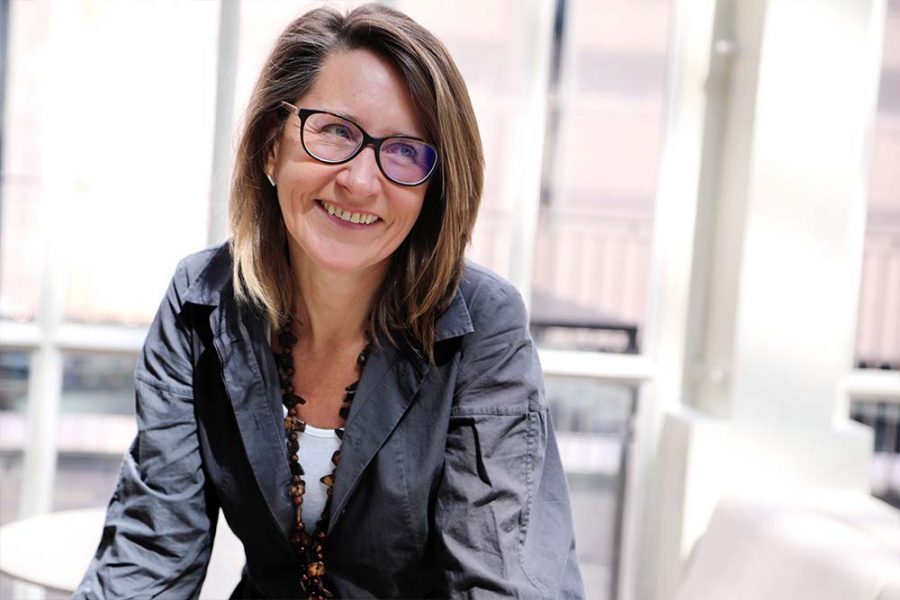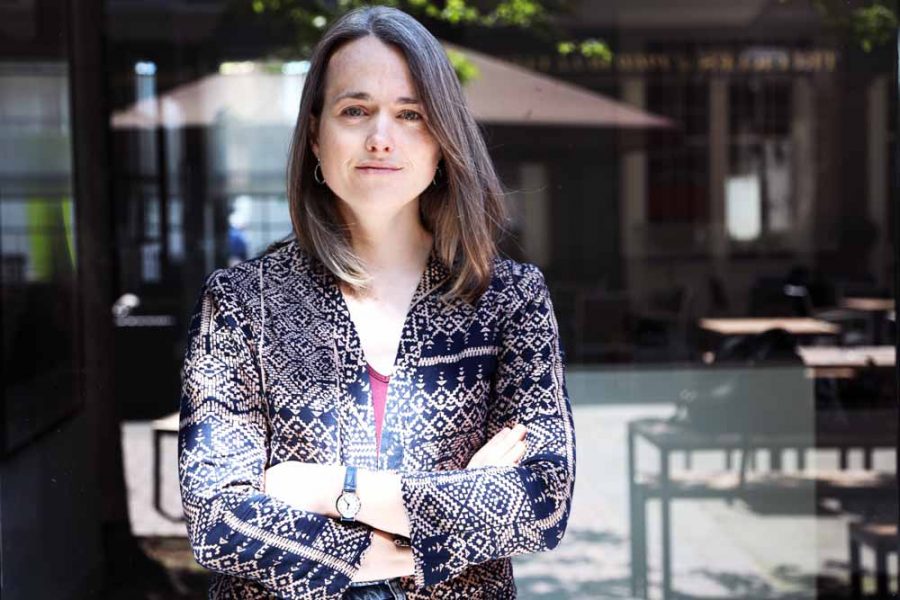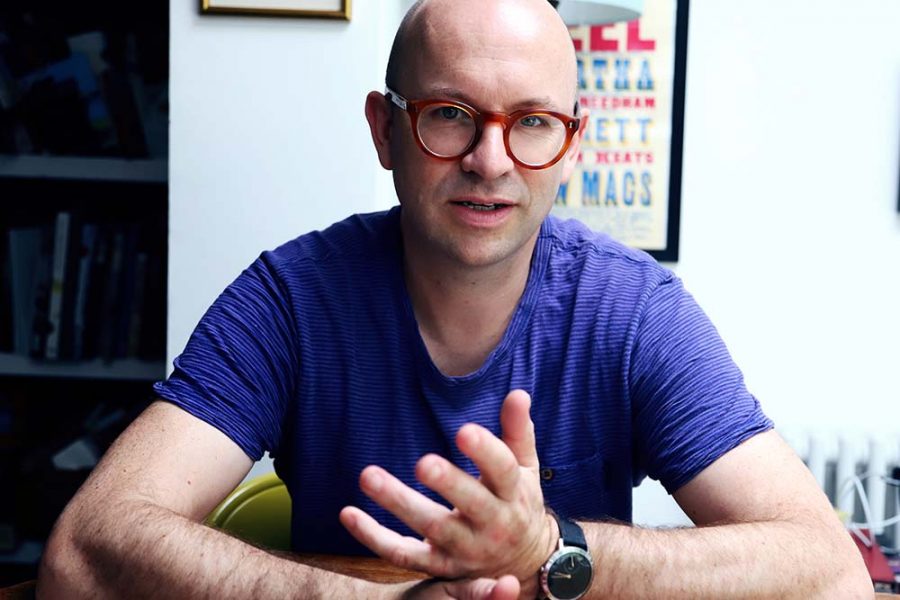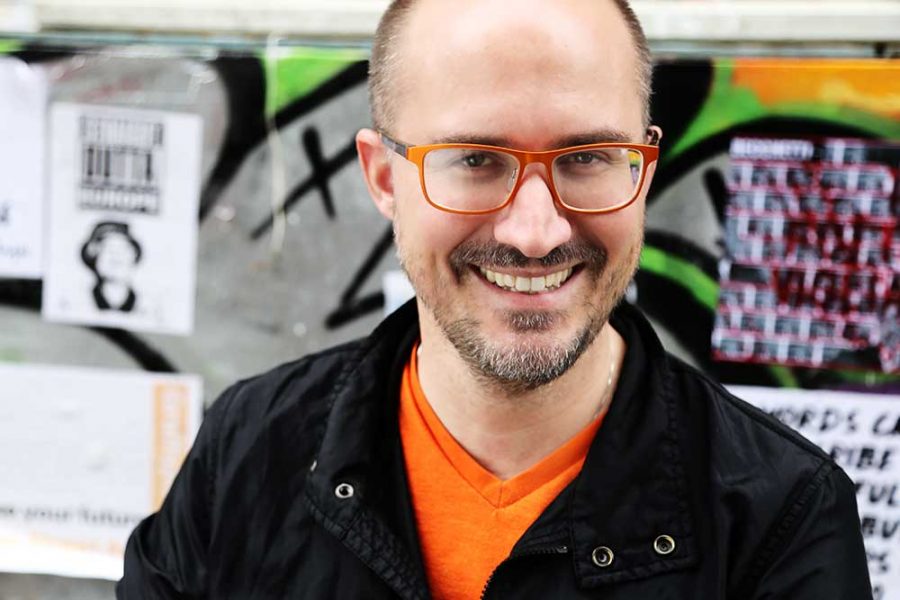The Building Blocks of Opera: James Clutton

February 2016
Words by
Emer Nestor
Photos by
Frances Marshall
James Clutton, Director of Opera at Opera Holland Park, has worked as an independent producer of plays, musicals and opera over the course of an immensely successful career. Together with General Director Michael Volpe, Clutton heads London’s premier summer opera festival, OHP.
As one of the UK calendar’s seasonal highlights, the event has garnered enormous respect from critics, performers, and audiences throughout the kingdom for its unique and hugely accessible brand of opera. Bolstered by its resident orchestra, the City of London Sinfonia, the company is particularly noted for its production of works from the verismo repertoire and lesser-known pieces from the western canon, as well as an ecclectic mix of standard repertoire—the simulatenous opening of Flight and Trittico in the same week (both garnering 5-star reviews) illustrates the company’s versatility and ability to produce different styles of opera to the same high quality.
Accessibility is the key to OHP’s success, as spectators are invited into the seductive world of opera with beautiful music, affordable ticket prices and the opportunity to hear professional singers and musicians within the friendly environs of Holland Park.
Here, Clutton discusses his involvement with Opera Holland Park, relationships with larger opera companies, keeping within budget, the importance of nurturing future audiences, the valuable work being carried out by the ‘Inspire Project’, and the exciting times that lie ahead for the company.
Audiences may know a lot of the repertoire that we produce, but they are also prepared to trust us when we produce something more unusual."

How did you first become involved in the West End?
As an independent producer, I had been producing theatre off-West End and in repertory theatres around the UK: straight plays and musicals, including Happy End by Weill and Brecht, When did you last see my Mother? by Christopher Hampton, and an adaptation of Thomas Hardy’s Far from the Madding Crowd. One night, the West-End producer Bill Kenwright saw my production of the Broadway musical Romance Romance and liked what I had done with it. That started a dialogue between us and a few months later he asked me to work as a producer for him.
Why did you move towards Opera?
Much of this is with the benefit of hindsight, but I realised that a lot of commercial theatre was becoming more and more star-name driven. The marquee names were essential to producing work. When I had the opportunity in 2000 to work on the Opera Holland Park season as a producer, I started to realise that in opera, with some very notable exceptions, the marquee names are the operas and the composers. As a producer, that is incredibly liberating, as it enables you to concentrate on putting the best possible cast and creative team together and making it the best you can. Of course, certain companies like the Donmar Warehouse and the Almeida Theatre have become marquee names themselves and I think the body of work we have created at Opera Holland Park over the last 16 years puts us in that sort of category. Audiences may know a lot of the repertoire that we produce, but they are also prepared to trust us when we produce something more unusual.
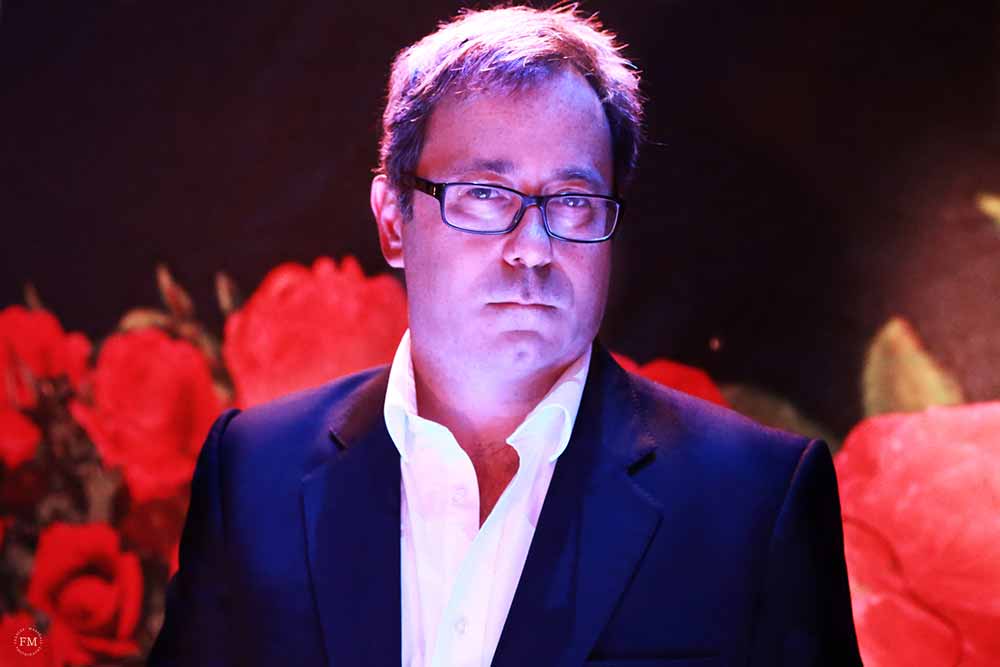

From your experience as a producer, what are the major differences between both performance worlds?
There are obviously some technical things that are different. For example, having no amplified sound, the actual technique of singing etc…, but very generally, I think that the performance worlds are very similar. With the cast, creative team and all the production staff on and off stage (in both opera and straight theatre), you will find groups of very focused, dedicated people that have chosen this profession and want to deliver the best performance that they can. No one goes into the business with money as the main driving force—and that is just as well! For most people working in the performing arts, there aren’t large financial rewards, so the people involved are working with different motivation to people working in many other industries. I believe that artists do their best work when they are in a supportive environment—what they need is someone to take away the outside distractions…make them feel supported and confident—giving them the basis on which to build their performance—and that is what I do here at Opera Holland Park. I think that is one of the reasons why artists enjoy working here so much.
Tell us about the vision behind Opera Holland Park and your collaboration with Michael Volpe in the everyday running of the festival.
At its most basic point, Opera Holland Park is about making quality opera accessible—bringing opera to as wide an audience as possible. Not only as a ticket price but also in the environment and the atmosphere that the company engenders. One of the keys for me is “for the enrichment of life”. I completely believe in that and in our championing and nurturing of British-based talent—whether that is conductors, directors, the creative teams, singers and all off-stage and on-stage staff. Our position enables me to give more opportunities to emerging artists and to guide them in improving upon skills that will stand them in good stead for future work in many companies across the UK, as well as at the Royal Opera House and other international houses.
Michael and I have worked together for a long time and are now the joint chief executives of Opera Holland Park. Having worked together for so long, most of our collaboration is about knowing what the other one is trying to do at any given time. We are almost exactly the same age and a lot of our cultural influences are very similar. We work most closely on choosing the repertoire for each Opera Holland Park season and on that we have very similar ideas anyway. A lot of the time we work individually: Michael on the fundraising and business planning and me on putting the productions together—choosing the creative teams, casting, working with the creative teams on shaping the final production, leading our outreach work and building artistic partnerships.
What does OHP do to counteract the image of the ‘underdog’ when compared to the larger festivals and opera houses?
I don’t think we try to counteract it because I don’t think of it like that. The opera companies in the UK are a very collegiate group and each has a place in the shape of UK opera. And I don’t think that opera is all about money and resources. Smaller companies (in funding terms) are always capable of creating exciting and thrilling work—sometimes, though certainly not always, financial limitations increase artistic imagination. A few years ago we produced La forza del destino, directed by Martin Duncan and designed by Alison Chitty, and the set was more or less 80 chairs on a bare stage. Audiences loved it and it received rave reviews from the likes of Hugh Canning and Rupert Christiansen.
Opera Holland Park is about making quality opera accessible – bringing opera to as wide an audience as possible."


Do you think that OHP would fare as well if it had to compete with the large opera houses during peak season?
I think we would do just fine—the Royal Opera and ENO both have seasons that overlap the start of our season, as well as the Proms at the other end of our season. A lot of the audiences for those opera houses come to us anyway for something a bit different, in terms of repertoire, and because they have trust in our casting choices and in the sort of productions we deliver.
Funding constraints often cause difficulties in maintaining standards — how do you deal with such issues?
I think wherever you work, at whatever level, you have to be realistic and cut your cloth accordingly. For me, there is no particular skill or cache in achieving something artistically if it is beyond your means. I try to get Opera Holland Park the best possible value for money that I can, whether that is on the money spent on sets or costumes or at the studios we rehearse in. I take pride in keeping to budget. A lot of that comes from the days when I was producing for myself using my own money, and when I worked for Bill Kenwright and it was HIS own money. When you look at it like that, it gives you a different perspective to looking after costs.
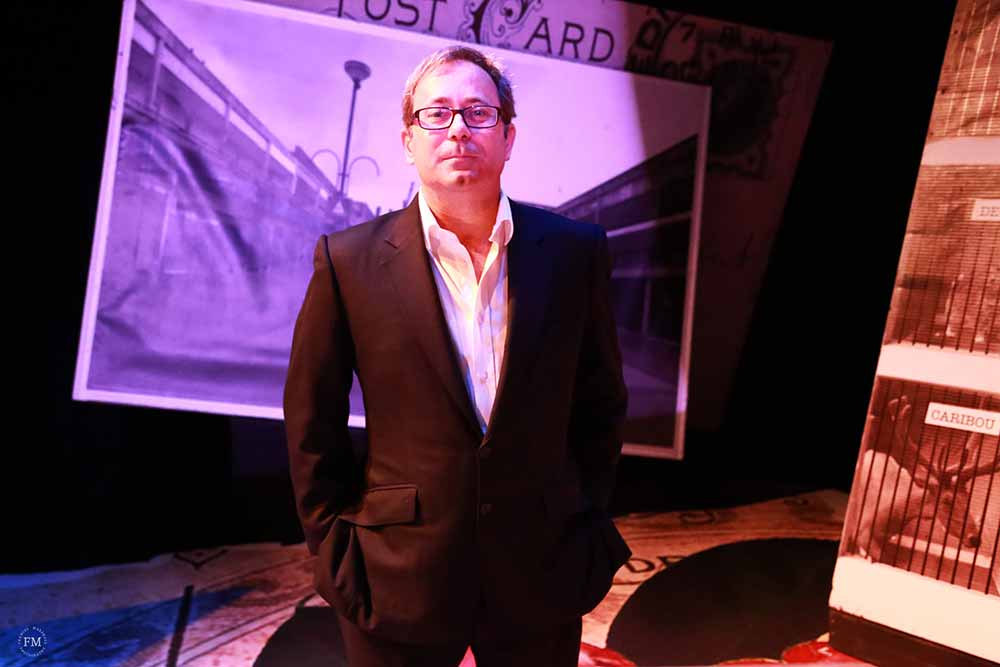


How does the ‘Inspire Project’ set about cultivating interest in opera within future generations?
The ‘Inspire Project’ covers all of the outreach work that we do at Opera Holland Park, including all of our work in the community with: day centres and care homes for people with dementia, where we work closely with this amazing charity called Playlist for Life; lots of other musical work at hospitals; adult learning; disability day centres; as well as schools.
The developing interest in opera for future generations is a major part of ‘Inspire’ but not the only strand. Over the last six years, we have produced a family opera in the Yucca Lawn, which is in Holland Park. We produced Fantastic Mr Fox by Tobias Picker and Donald Sturrock, which was based on Roald Dahl’s book, and since 2013, we have produced and sold out Alice’s Adventures in Wonderland by Will Todd and Maggie Gottlieb (based on the Lewis Carroll classic). On both of these productions, we have kept the prices very low. Last year tickets for Alicecost £5 for children and £10 for adults. Along with the sheer quality of the work, for this ticket price the audiences had a cast of 16 and a chamber orchestra of 11—all moving around the park with them in a promenade production.
I treat these productions very seriously—we have a top-rate creative team on Alice: Martin Duncan (director), Matthew Waldren (conductor) and Leslie Travers (designer). At Alice, at each scene, the audience are seated on the ground just a few feet away from the singers and the orchestra, and it matters to me that children are experiencing opera within such close proximity. It is about breaking down barriers and enabling children at a young age to engage with the music. I think that is the way to developing the audience of the future. It is becoming more and more important to find opportunities to get people engaged with classical music earlier—before they even realise that some people think of opera or classical music as “difficult”. If it becomes normal to them, I think they are more likely to start going for themselves in their 20s. I hope that coming to Alice will play a part in giving young people the confidence to go to other operas, and to be able to decide for themselves if they do or don’t enjoy any particular one. Going to the opera should be like books, movies or food—some you enjoy, some you don’t. But an audience needs confidence to be able to make those choices.
What elements of the opera business do you enjoy the most?
1 Developing and nurturing talent is definitely one of the most enjoyable and rewarding aspects of my job—finding young talent, initially spotting them and then, over time, working with them to give them the right coaching and helping them in developing their career in a sensible way.
2 Giving artists the right opportunity at the right time.
3 I love putting the creative teams and casts together. When I start work on each new season, it is like working on a blank canvas. I spend a lot of time putting the creative teams together—looking at different combinations and deciding who will bring the best to the production for the audience and the company.
You’ve recently moved ‘inside’ to the Royal Opera House with a new production of William Todd’s Alice’s Adventures in Wonderland — how did the project come into being?
Having produced Fantastic Mr Fox at Opera Holland Park for three successful years, we were talking about what to work on next and the logical step seemed to be to commission our own opera. We wanted to continue to work on family operas and Alice became our subject. We approached Will Todd, whose work we all admired, and put him together with librettist Maggie Gottlieb. They had never collaborated before but it seemed to work pretty well!
When I commissioned this piece, I asked the writers for The Simpsons, because I wanted something that would appeal to adults and children—that both groups would sometimes laugh at the same line, but for different reasons. I think it is an excellent introduction to opera for children, but also an excellent introduction for adults who are coming to opera for the first time too. I do always say that it is a family opera rather than a children’s opera because it is a great way for families to spend time together.
Would you like to see OHP taking up permanent residency in a theatre?
I don’t think so…as a permanent residency…no. We did take our production of Tosca with Amanda Echalaz to Richmond Theatre in 2009 and that went very well. We may look at taking a production to other theatres occasionally, but it certainly isn’t in our plans at the moment to do this regularly.
What does the next season hold in store for all at Opera Holland Park?
This coming season is an incredibly exciting one for us all at Opera Holland Park—the first season as an independent company. We open with Iris by Mascagni, which was one of the first pieces Opera Holland Park ever produced. This is a new production, directed by Olivia Fuchs and conducted by Stuart Stratford, who is the new Music Director of Scottish Opera. We also have a new production of La bohème, conducted by Matthew Waldren and directed by Stephen Barlow, which is a very exciting prospect. New productions of La Cenerentolaand Die Fledermaus follow, with a new production of Queen of Spades closing the main stage season, and our ever-popular Alice’s Adventures in Wonderland returning to the Yucca Lawn at Holland Park.
I think it is an excellent introduction to opera for children, but also an excellent introduction for adults who are coming to opera for the first time too."

For more information on Opera Holland Park see: www.operahollandpark.com
All content and imagery displayed within this article is subject to copyright.
Share this article


